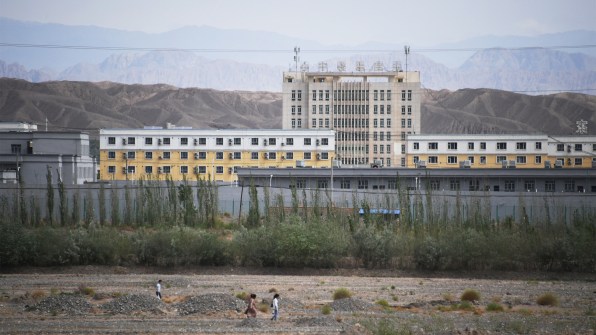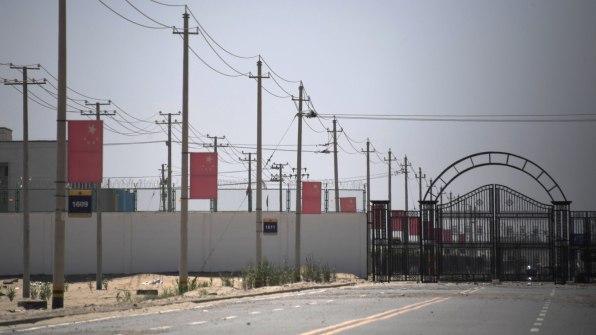“This forced labor is connected to Western supply chains and consumers.”
BY ELIZABETH SEGRAN3 MINUTE READ
Slavery and indentured labor is widespread in the fashion industry, as I’ve reported in the past. This week, the South China Morning Post reports that China experts have gone to Capitol Hill to explain to lawmakers that American apparel brands may be benefiting directly from coerced labor carried out by Uyghurs, a Muslim ethnic minority living in the Xinjiang autonomous region in China.
The New York Times says that more than a million Uyghurs have been forcibly held in camps and subject to political indoctrination. A United Nations human rights panel said that Uyghurs were being detained in a “massive internment camp that is shrouded in secrecy.” The Chinese government refers to these camps as “vocational training centers.” New evidence has emerged that some of these Uyghurs being coerced to work in factories that make apparel and clothing—and may supply American retailers.

A new report from the Center for Strategic and International Studies (CSIS) paints a bleak picture of how these minorities are picked up and thrown into these camps. “They are reportedly detained for growing a beard, international travel, WhatsApp usage, or for no known reason at all,” it reads. “These detentions combine with an unprecedented and all-pervasive surveillance system that permeates the lives and movements of the minorities who are not detained.”
The Post reports that U.S.-based scholars and experts spoke before legislators about how Uyghurs who have been forcibly held in detention centers have been put to work in factory jobs. Companies that used these factories staffed by Uyghurs would receive government subsidies for each individual trained and employed, along with shipping subsidies. This cheap labor along with the government subsidies would result in very low manufacturing costs, “undercutting global prices,” the Post says. This could turn Xinjiang into hub for low-cost manufacturing.
The CSIS’s report, which included interviews with former detainees, says many of these factories were producing goods for the apparel industry. And in disturbing news for American consumers, the U.S. received many of these exports.
“This forced labor is connected to Western supply chains and consumers, as Xinjiang produces over 80 percent of China’s cotton,” the authors write. “The United States in turn imports more than 30 percent of its apparel from China.”

Even if a product isn’t imported into the United States directly from Xinjiang, it may contain fabrics or components made from the forced labor that happens in the Xinjiang camps. For instance, the U.S. Customs and Border Protection has recently banned all imports from a clothing manufacturer called Hetian Taida Apparel, which is based in Xianjiang. Hetian had supplied pajamas to Costco and shipped 148 tons of clothing to the country, according to the Post.
The American Apparel & Footwear Association, which represents more than a thousand brands, offered a response to the CSIS report, saying it was an important contribution to our collective knowledge about manufacturing in China. “We have been working closely with our members to educate them with available information about labor practices in Xinjiang province, so they can conduct the necessary due diligence to assure that products were not made with, or use components that were touched by, forced labor,” the statement said. (Indeed, the association held a members-only, off-the-record conference call back in June about the Uyghur issue.)
The association also said that preventing this kind of forced labor should be a collaborative endeavor, one that involves NGOs, governments, think tanks, and others. It also asked the Chinese government to “facilitate all due diligence measures to assure a clear understanding of the facts and necessary actions are being taken to protect workers from forced labor.”
So far, the White House has not taken executive action about this situation to prevent Xinjiang from trading with the United States or the rest of the world. In the report from the Center for Strategic and International Studies, the authors recommend that the Trump administration impose sanctions on companies that have directly or indirectly engaged in serious human rights abuses.
But the experts, speaking to U.S. lawmakers, said that companies themselves should be responsible for proving that their products were not made using coerced or forced labor. At the same time, the experts acknowledged that it was hard to get a clear view of what was happening in Xinjiang because authorities in the region aren’t giving journalists, officials, or inspection teams much insight into the conditions into the factories there.
ABOUT THE AUTHOR
Elizabeth Segran, Ph.D., is a staff writer at Fast Company. She lives in Cambridge, Massachusetts

